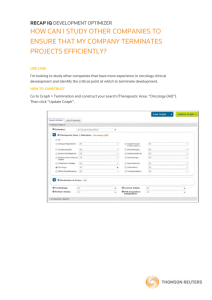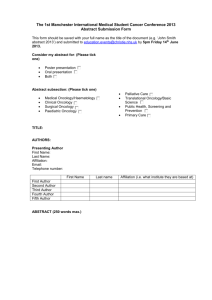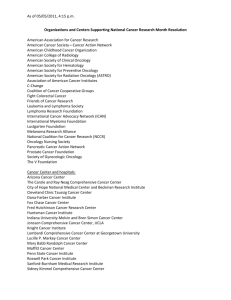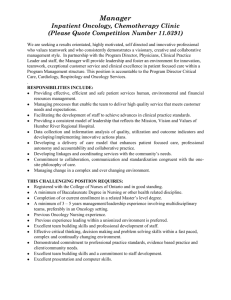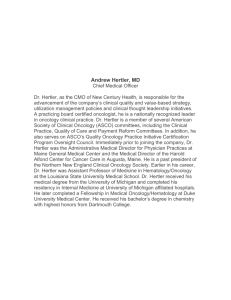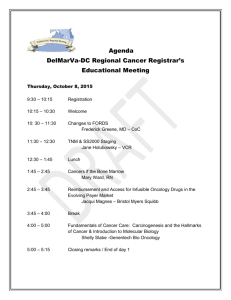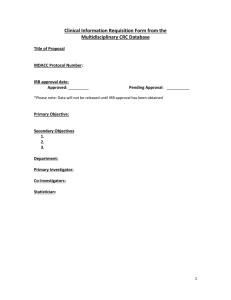Measuring Quality and Value in Oncology
advertisement
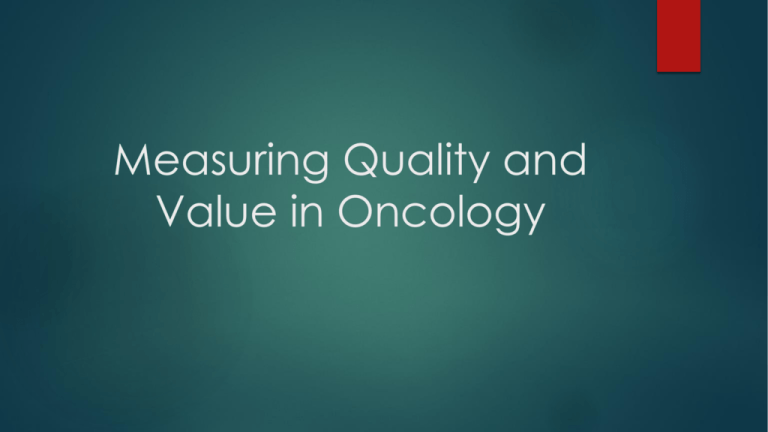
Measuring Quality and Value in Oncology The Need for Measurement • Payers (Medicare and private insurers) are demanding quality, cost control, accountability, and predictability – • Measuring quality and value in cancer care now enabled by IT The cost of treating cancer is increasing – Payment of cancer care is at a crossroads – Cancer patients under active therapy represent 1% of patients but 10% of payer’s costs The Need for Measurement Little effort to measure health care quality until just a few decades ago Most aspects were considered unmeasurable I don’t judge my colleagues quality of care through formal measurement That may work for me, but what about everyone else? The Need for Measurement Additional research revealed wide variability in the safety and quality of health care Success in measuring hospital readmission rates National readmission rates declined from 19% to 17.5% Not all measurements produce good behaviors CMS hospital quality measure: first dose of antibiotic given within 6 hours after presentation Led to inappropriate antibiotic use in patients without pneumonia Federal Initiatives Physician Quality Reporting System (PQRS) Meaningful Use of Electronic Health Records Federal Initiatives Federal Initiatives Federal Initiatives Federal Initiatives Federal Initiatives Federal Initiatives Federal Initiatives The McNamara Fallacy Just because you can measure it, doesn’t mean it is relevant, important, or informative The COA OMH Game Plan Create general consensus and unity among stakeholders • Patients • Payers • Providers Agree on quality and value • Measures – – Patient satisfaction – With benchmarking With benchmarking Create a template for viable payment • Private payers • Medicare Help practices implement • Process change • Payer contracting • Accreditation • IT Solutions Oncology Medical Home Summary Model Identify Stakeholder Needs Define Model Elements Measurement Implementation Develop Payment Quality/Value Identify Vendors Measures Develop Develop Patient Certification/Recog Satisfaction Tool nition Categorize Tools Develop Practice Implementation Guide Identify Viable Payment Models Develop Private Payer Templates Develop Medicare Model Oncology Medical Home IT Advisory Team Representation Industry Representation Practice Representation Altos Florida COA Georgia CoC Ohio COME HOME Texas Elekta FlatIron iKnowMed Net.Orange Unlimited Systems Varian Oncology Medical Home Oncology Medical Home Oncology Medical Home Oncology Medical Home Oncology Medical Home Cancer Care Satisfaction Survey: Developed by oncology stakeholders for oncology stakeholders Using guidance and resources from: ALL resources are FREE to ALL providers of cancer care Practices must register on the OMH web site for benchmarking: http://www.medicalhomeoncology.org/coa/register.htm Cancer Care Satisfaction Survey: Current usage: Over 36,000 surveys 1,165 registered providers Our practice, surveys performed twice Update is being planned Aligns with upcoming changes to CAHPS core questions Will allow comparisons to other specialties Target date - May 4th, 2015 14 Benchmarking/Survey Reports Example: Summary Scoring Patient Satisfaction Surveys Question In the last 12 months, how many days did you usually have to wait for an appointment when you needed care right away? In the last 12 months, when you phoned this provider’s office during regular business hours, how often did you get an answer to your medical question that same day? Median Result Same day 1 day 2 to 3 days 4 to 7 days More than 7 days 50% 23.6% 16.5% 5.7% 2.7% Median Result Always Usually Sometimes Never 71.4% 21.0% 5.9% 1.6% Patient Satisfaction Surveys In the last 12 months, did you feel that this provider always told you the truth about your health, even if there was bad news? Median Result Yes, definitely 92.7% Yes, somewhat 6.4% No 0.7% In the last 12 months, how often did this provider spend enough time with Always you? Usually In the last 12 months, did your primary care physician or other specialist team seem informed and up-to-date about the care you received from your hematology/oncology provider? Median Result 80.5% 16.4% Sometimes 2.1% Never 0.4% Median Result Always 61.8% Usually 23.4% Sometimes 7.9% Never 4.0%
